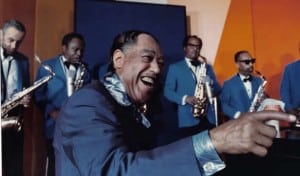In an ongoing quest to make new musical discoveries through its acclaimed American Composers Festival (ACF), Pacific Symphony, led by Music Director Carl St.Clair, on May 16, 17 and 18 will celebrates the music of two seemingly disparate figures, representing past and present: the iconic Edward Kennedy “Duke” Ellington (1899-1974) and living saxophonist-composer Daniel Schnyder, neither of whom fit neatly into a single musical category.
ACF, an annual celebration of American composers, seems somehow incomplete without the inclusion of Ellington, whose works have inspired countless composers and musicians of the 20th and 21st centuries—including Schnyder. This year, the Symphony doesn’t just refer to Ellington, but presents the ensemble that carries his name and has been playing together in one form or another for more than eight decades; the other half of the equation is this year’s ACF composer-in-residence Schnyder—both of whom defy definition.
“A couple of summers ago when I performed with the Duke Ellington Orchestra at the Verizon Wireless Amphitheater, I fell in love with it—the musicians, their love and enthusiasm for music,” says Maestro St.Clair, giving light to the festival. “I immediately began searching for an opportunity to work with them again. Our American Composers Festival is the perfect opportunity.”
“Schnyder is a composer who, though steeped in classical traditions, has created musical language that crosses many musical boundaries and genres,” says St.Clair. “This is also evident in the repertoire selected for the first half [all composed or arranged by Schnyder], which encompasses reflections of the great Duke Ellington, tributes to the immortal Jimi Hendrix and to the instrument, the bass trombone. And all of this really only covers a portion of the breadth of Schnyder’s musical language—all of which he feels at home within. Like Duke Ellington, Schnyder is a virtuoso performer—and as performers both composers gained distinct insight into writing for ensembles.”
The program will include “Martin Luther King” from “Three Black Kings,” which was Ellington’s last composition, one left unfinished at the time of his death in 1974. For the posthumous Lincoln Center premiere in 1976, Ellington’s son, Mercer Ellington, completed the score and Alvin Ailey created the choreography. The title refers to three important African American historical figures: King Balthazar, King Solomon and civil rights leader Martin Luther King Jr. King’s widow, Coretta Scott King, introduced Ailey’s “Three Black Kings” when it premiered at the Lincoln Center festival celebrating Ellington.
The concert opens with the spotlight on Schnyder. “No less than Ellington, Schnyder is a gifted performer and improviser (on the saxophone),” says Horowitz. “Like Ellington, he espouses multiple musical worlds. He is an omnivorous creator, drawing on Renaissance polyphony, Schubert and Mahler, Ellington and Gershwin, Arabia and Africa.”
The Symphony then performs an arrangement by Schnyder of Jimi Hendrix’ (1942-1970) Variations on “Purple Haze”—a piece that has, frankly, become known as one of the archetypical psychedelic drug songs of the ’60s. Hendrix claimed the piece was inspired by a dream where he was walking under the sea where a purple haze surrounded him, engulfed him and made him feel lost and traumatized. Hendrix claimed it had nothing to do with drugs, but of course few deny that Hendrix was indeed using plenty of drugs at the time.
While “In a Sentimental Mood” has sophisticated chord changes, in Schnyder’s hands “’Purple Haze’ doesn’t really have any chord changes. “It’s just a rhythm and the idea of blues…” he says. “And with the brutality of this music—(it’s about) how to write for orchestra and retain raw expression. My arrangement has fugues and canons. You can do all these things because the piece is so raw, so bare, that it’s an open playing field.”
